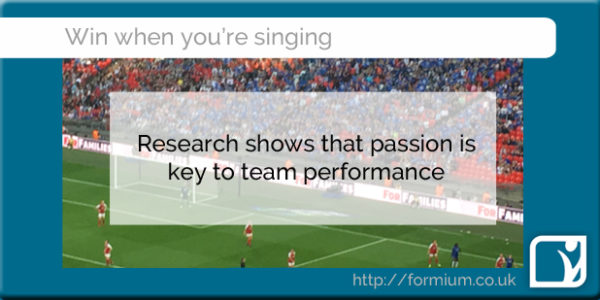In Britain, football crowds have songs for every occasion. If your team overturns a losing position, to taunt the opposition fans now sitting in crestfallen silence, you bellow at them: “You only sing when you’re winning” (improbably to the tune of a traditional Cuban song, Guatanamera).
But have the fans got this the wrong way round? Some recent research highlighted on the informative website The Conversation suggests that you only win when you’re singing. Having studied the 2016 European championship, the academics Slater, Haslam and Steffens reckon you can predict the result of an international football match by how passionately the teams sing their national anthem (regardless of how good the team is perceived to be).
So, apart from giving you a fun game to try at home during this World Cup, what impact could this study have for you as a manager or leader?
1. The best results are achieved by the most passionate
This aligns with a key concept of positive psychology, that we do our best work when we are doing something we are really engaged with. We’re not saying you need to come into your office singing everyday, but that you need to find a role or tasks that you believe in, that positively challenge you, that gives you the opportunity to reach a state of ‘flow.’
If this doesn’t sound like you, then you could analyse your strengths (e.g. using the VIA survey) and see if you can more closely align your work with your strengths – a short-cut to working with passion.
2. It has to be real
One of the interesting findings was that there was no benefit when the players were instructed to sing up (as England players were memorably asked in 2014). The passion of the singing is a direct result of the underlying camaraderie and team spirit.
So think about your team development – what could you do to create the conditions in which your team can organically grow?
- Create opportunities for natural social interaction – e.g. a drinks break in a team meeting
- Assign two team members to work on a task together, to build familiarity and trust
- Establish collectively a clear team goal, with everyone understanding their role
- Use an Appreciative Inquiry approach to help each team member understand the input, perspective and value of each other
3. Don’t ignore a bad team spirit
I’ve met many managers who are happy to treat their team as a group of individual performers, not bothering if there is antagonism in the team, providing the work gets done. Slater et al’s study suggests they’re wrong – that how a team interacts really does impact on performance. It may be hard work, but addressing team conflict and proactively encouraging a better team spirit will pay dividends in the long run.
4. Actions speak as loud as words
The study indicated that body language and non-verbal cues were important, not just singing. The challenge for you as a manager is to keep your eyes open – be sensitive to how your team members interact, not just what they say to each other.
Help is at hand
If you want advice or help in building your team, Formium Development can help with guidance, facilitation, executive and team coaching,.
Check out our resources on teams:
10 actions to build a strong team
Checklist for a Positive Team Meeting
Eszter Molnar Mills is a strength-based leadership and organisation development specialist and founder of Formium Development. A qualified executive and team coach, she helps organisations and individuals reach enhanced performance by reflecting on what works, and developing skills and strategies for improvement. Through team coaching and facilitation Eszter also helps organisations and teams work together to develop positive and productive cultures.
